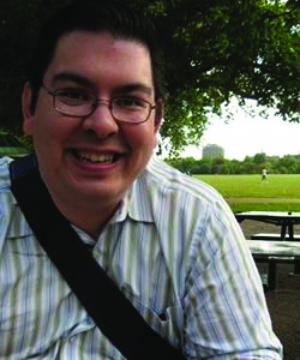Ryan Fong is an Associate Professor of English at Kalamazoo College, where he serves as director of the Women, Gender, and Sexuality Program. He received his BA from Whittier College and his PhD from UC Davis and teaches courses in nineteenth- and twentieth-century British literature. He has published widely on Dickens and on the themes of gender, sexuality, and empire in Victorian literature, and has been one of the leaders in rethinking the boundaries of Victorian studies and opening the discipline up to include the voices and works of the formerly underrepresented and excluded writers and thinkers of the period.
Ryan has been a devotee of the Dickens Universe since 2008, when he first attended the graduate seminar that year at the behest of Catherine Robson, then a professor at Davis and herself a long-time Universe faculty member. He has since risen through the ranks of Universalists from student to graduate assistant to faculty member, and, as a member of the Dickens Project executive committee, helped create the Universe’s forthcoming program combining David Copperfield and Iola Leroy this summer. We chatted in January about his professional coming of age with Dickens and the Victorians and his love of participating in all aspects of the Universe.
Q: How did you become a Dickens scholar?
A: I came to Victorian literature late. I grew up watching Oliver! and Jane Austen adaptations, but thought I hated the books themselves. When I started my PHD, my focus was on twentieth-century British literature and the legacy of empire. I ended up in Catherine Robson’s Victorian literature seminar to fulfill a requirement, and when I read Bleak House, I was unexpectedly enraptured and just knew this was it for me. Then, when I went to my first Universe, the Hard Times/Mary Barton year, the joy and rigor of the program made it clear that these were my people and I belonged here.
Q: How did you stay involved with the Universe?
A: After my first year, I applied to be the “cruise director” for the grad students so I would get to come back, and got the job. Then John and Joanna asked me to do it again the next year. I kept working on ways to come back every year. When I got the job at Kalamazoo, I convinced the provost to kick in for the consortium fees so we could join. I’ve made it 14 years in a row so far.
Q: What are your favorite things about the Universe?
A: Part of the magic is plugging back into the rituals every year—going to tea, having that first taste of the ginger punch and feeling refreshed, going full glutton at the Grand Party, the bliss of doing the Roger de Coverley for another year at the dance. My whole life as a scholar has been mapped through the Universe—the wonderful people and the opportunities it has created for me.
Q: What have some of the highlights been?
A: The key moment was my first faculty year (2012), when I got to do one of the afternoon talks about Bleak House. It was a real coming of age moment for me. My parents came down from Sacramento. Catherine was there and got to meet them. Wow, I thought, I have really made it.
Q: How do you manage what some see as a tension between the Universe’s traditional emphasis on appreciating Dickens’s greatness and the current trends in Victorian scholarship that focus on previously under-discussed aspects of Victorian life like imperialism, racism, and misogyny, and look at Dickens’s failures of vision?
A: It’s not an either-or, not a matter of loving or hating Dickens and his contemporaries. The Victorian period is where the many of our contemporary discourses of race and colonialism solidified. Dickens is a part of this. He has some horribly racist writing, in both his novels and his prose. We have to grapple with his flaws as well as his strengths, and reconsider what “greatness” means. The joy of experiencing his language and immersing ourselves in his worlds is tempered by acknowledging what he misses and the harms his representations create. Our relationship with Dickens must be a complicated one, and what we’re trying to do is honor that complexity.
Q: Why did you pick Iola Leroy to pair with Copperfield?
A: Tricia Lootens originally suggested it. We wanted to have a work by an African-American writer, and were initially thinking of Frederick Douglass’ remarkable narrative. But having a novel seemed like a better fit for the Universe, and we couldn’t resist the opportunity to feature the work of Francis E.W. Harper, who was a monumental figure in African American literary cultures in the nineteenth century. Harper is certainly a different kind of writer than Dickens, but they also have a lot in common as public intellectuals who published widely in different genres, did important journalism, had deep political interests, and were read widely on both sides of the Atlantic.
Q: Where does the Universe go from here?
A: Race and imperialism aren’t going to go away as things we need to talk about. It’s part of how Dickens studies as a field must evolve. It’s important to remember that there was a time in the not so recent past when studying Dickens and gender was radical and unexpected, and maybe even a little unsettling for some people. Reckoning with Dickens’s complexity in how we study and grapple with race in the nineteenth century is how we bring the next generation of scholars and Universalists together—with both a critical appreciation of the “greatness” of Dickens’s writings and deep discussions about what it means to be “great” in the first place.

